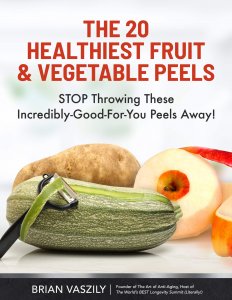One of the biggest threats to the health of our skin is sun damage. Beyond the painful short-term damage of burns and blisters, harmful UV sun rays can do even more damage to your skin in the long term, causing premature aging, wrinkles, and even skin cancer.
Using a safe sunblock product and wearing protective clothing if you are going to be out in the sun for an excessive period of time is crucial – especially during mid-day when UV rays are the strongest. However, what most people don’t know is that there are certain foods that act as “internal sunscreens,” safeguarding your skin from within. Before we share what those specific foods are, it’s important to understand how UV radiation can damage your skin.
What Causes a Sunburn?
When you go out into the sun, you’re exposed to ultraviolet (UV) radiation, including UVA and UVB rays, both of which penetrate the outer layers of your skin. While UVA rays penetrate deeper into the skin, causing signs of premature aging and wrinkling, it’s the UVB rays that are primarily responsible for sunburns.
Those UVB rays damage the DNA in your skin cells, triggering an inflammatory response. This causes the blood vessels near your skin’s surface to widen, which makes your skin red and warm to the touch—the telltale signs that you have a sunburn. Over time, repeated sunburns can cause premature aging, wrinkles, and even skin cancer.
Antioxidant-Rich Foods Protect Your Skin from Within
Eating foods rich in antioxidants can supply you with an additional layer of protection—acting as “internal sunscreens” that help to fortify your skin’s defenses against UV damage. They do that by neutralizing the harmful free radicals generated by exposure to the sun’s UV rays and reducing the inflammation that can lead to sunburn.
Science also shows that when you eat those foods matters. For the best protection, experts recommend eating these sun-protective foods during the day.
Research suggests you should also avoid late-night snacking. That’s because eating at night can disrupt the protective enzymes—called xeroderma pigmentosum group A (XPA)—which helps to shield your skin and repair damage caused by the sun’s UV rays.
These Are the Best Sun Protective Foods to Add to Your Diet

Tomatoes: If you love tomatoes, you’re in luck. Not only are they delicious, they’re an excellent source of lycopene, which is an antioxidant that helps to neutralize harmful free radicals caused by UV radiation from the sun. Lycopene also helps your skin to produce collagen, which is one of the most important anti-aging proteins. It helps to keep your skin thick and plump, protecting against fine lines and wrinkles. Since lycopene is fat-soluble, experts recommend eating potatoes with a healthy fat, such as olive or avocado oil. For maximum absorption, you’ll want to eat 10 mg of fat at a meal that contains processed tomato products or 15 mg if the tomatoes are raw.
 Carrots and Sweet Potatoes: The bright orange color of carrots and sweet potatoes comes from beta-carotene. This powerful antioxidant, which is converted to vitamin A in the body, helps to neutralize harmful free radicals in your skin that are generated by UV radiation from the sun. In fact, once beta-carotene builds up to protective levels in your skin, it also acts as a “natural sunscreen” by absorbing UV rays. Plus, the vitamin A from beta-carotene supports collagen production, which helps to protect against wrinkles and sagging caused by sun damage. To benefit from their natural sun protection, aim to eat carrots and sweet potatoes regularly, raw, roasted, steamed, or mashed.
Carrots and Sweet Potatoes: The bright orange color of carrots and sweet potatoes comes from beta-carotene. This powerful antioxidant, which is converted to vitamin A in the body, helps to neutralize harmful free radicals in your skin that are generated by UV radiation from the sun. In fact, once beta-carotene builds up to protective levels in your skin, it also acts as a “natural sunscreen” by absorbing UV rays. Plus, the vitamin A from beta-carotene supports collagen production, which helps to protect against wrinkles and sagging caused by sun damage. To benefit from their natural sun protection, aim to eat carrots and sweet potatoes regularly, raw, roasted, steamed, or mashed.

Green Tea: If you love green tea, here’s a reason to drink more of it. It’s rich in polyphenols—especially epigallocatechin gallate (EGCG)—which helps to neutralize harmful free radicals caused by UV radiation, preventing oxidative stress and reducing inflammation in the skin. By protecting skin cells’ DNA from damage, green tea may also help to lower the risk of skin cancers and premature aging caused by sun exposure. Plus, the polyphenols in green tea help to support the skin’s elasticity and firmness by slowing the breakdown of collagen—so your skin looks healthier.
 Almonds: Almonds are rich in vitamin E, which is a powerful antioxidant that helps to neutralize harmful free radicals caused by UV radiation from the sun. Even more amazingly, almonds are especially protective against damaging UVB rays, helping to reduce oxidative stress and inflammation in the skin. Plus, almonds contain flavonoids, polyphenols, and phytosterols, which are antioxidants and natural anti-inflammatories that protect your skin.
Almonds: Almonds are rich in vitamin E, which is a powerful antioxidant that helps to neutralize harmful free radicals caused by UV radiation from the sun. Even more amazingly, almonds are especially protective against damaging UVB rays, helping to reduce oxidative stress and inflammation in the skin. Plus, almonds contain flavonoids, polyphenols, and phytosterols, which are antioxidants and natural anti-inflammatories that protect your skin.

Dark Chocolate: Dark chocolate—especially the really dark kind with a high cocoa content—contains flavonoids like epicatechin and catechin. These are powerful antioxidants that help to protect your skin from damaging UV light. Plus, the flavonoids in dark chocolate help to improve skin hydration, texture, and elasticity, which aids in protecting your skin from sunburn and UV-induced damage. If you love dark chocolate, this is excellent news!
 Spinach & Kale: Not only are spinach and kale delicious, they’re also good sources of beta-carotene, which helps your skin to regenerate and renew itself. These leafy greens also contain lutein, an antioxidant that helps to absorb harmful UV rays from the sun. Lutein also helps to neutralize free radicals, which can protect against sunburn and premature aging. Spinach and kale also supply vitamins C and E, which promote collagen production, maintain skin hydration, and give your skin additional protection against oxidative stress from the sun.
Spinach & Kale: Not only are spinach and kale delicious, they’re also good sources of beta-carotene, which helps your skin to regenerate and renew itself. These leafy greens also contain lutein, an antioxidant that helps to absorb harmful UV rays from the sun. Lutein also helps to neutralize free radicals, which can protect against sunburn and premature aging. Spinach and kale also supply vitamins C and E, which promote collagen production, maintain skin hydration, and give your skin additional protection against oxidative stress from the sun.

Red Grapes: As you may already know, red grapes are rich in resveratrol, a powerful antioxidant that protects the heart. But what you may not know is that resveratrol also helps to neutralize harmful free radicals caused by UV radiation from the sun. Red grapes are also packed with vitamin C, which supports healthy collagen, as well as vitamin E, which helps your skin maintain its moisture and protects your cell membranes.
 Blueberries: Blueberries are bursting with powerful antioxidants called anthocyanins that help neutralize harmful free radicals caused by the sun—reducing the oxidative stress on your skin, as well as inflammation. Plus, blueberries are excellent sources of vitamins C and E, which help your skin generate more collagen and protect your skin cells from oxidative damage.
Blueberries: Blueberries are bursting with powerful antioxidants called anthocyanins that help neutralize harmful free radicals caused by the sun—reducing the oxidative stress on your skin, as well as inflammation. Plus, blueberries are excellent sources of vitamins C and E, which help your skin generate more collagen and protect your skin cells from oxidative damage.
Plus, “Feed” Your Skin Nature’s Powerful Ingredients Against Sun Damage
In addition to eating foods that help to protect your skin from within, it’s important to “feed” it topically as well.
One of the best nutrients you can give your skin is astaxanthin, a powerful antioxidant against harmful UV rays. It supports the skin in combating photoaging—such as the appearance of dark spots and wrinkles caused by sun-related damage.
The Age-Defying Dream Cream from Purity Woods contains astaxanthin from red algae, a rare skin-loving superfood that helps to reduce the appearance of sun-damaged skin. Plus, it provides your skin with superstar moisturizers like sunflower oil, which is extremely high in vitamin E to “lock moisture in” and combat the “weathered look” from the sun’s UV rays.
Plus, the entire formula is USDA Certified Organic, which means zero toxins or synthetic additives.
Learn more about the Age-Defying Dream Cream here and be sure to nourish your skin against the effects of the sun—both inside and out!


